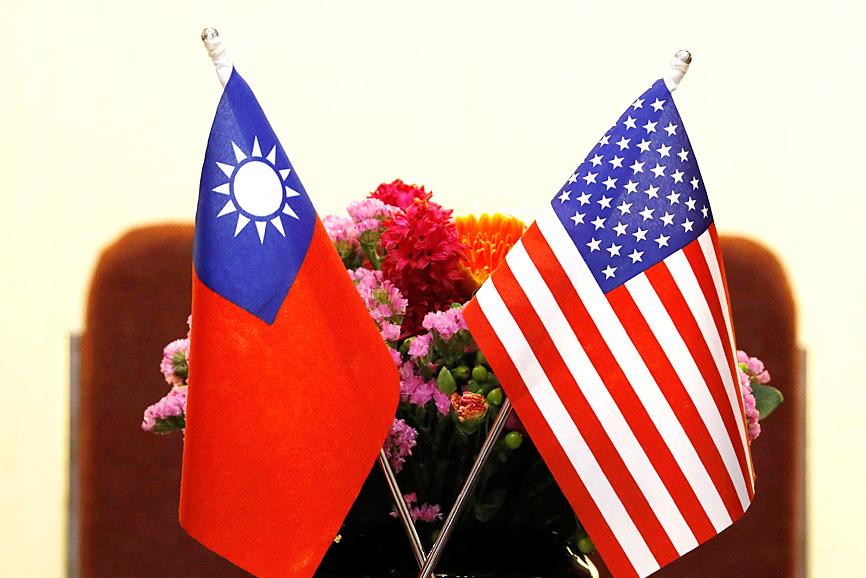Two hundred US lawmakers in a letter on Wednesday called for Taiwan’s participation in the planned Indo-Pacific Economic Framework (IPEF), touting the nation’s economic importance and the signal of support it would send to counter Chinese intimidation.
The letter, drafted by the four cochairs of the Congressional Taiwan Caucus and addressed to US Secretary of Commerce Gina Raimondo and US Trade Representative Katherine Tai (戴琪), said that Taiwan should be “at the front of the line” to join the framework.
US President Joe Biden in October last year proposed the IPEF to boost economic cooperation with Indo-Pacific partners.

Photo: Tyrone Siu, Reuters
The move is considered to be Washington’s latest effort at countering growing Chinese influence in the region in the wake of its withdrawal from the Trans-Pacific Partnership in 2017.
Calling the reasons for including Taiwan “compelling,” the letter outlined the nation’s strengths as a major Indo-Pacific economy.
It not only served as the eighth-largest trading partner to the US last year with US$114 billion in total volume, but has also aided in diversifying the US supply chain away from overdependence on the People’s Republic of China (PRC), the letter said.
It also highlighted economic engagement with Taiwan through the US-Taiwan Economic Prosperity Partnership Dialogue — which covers topics similar to those considered for the IPEF — and the Global Cooperation and Training Framework (GCTF), which also includes Japan and Australia as full partners.
Other regional economies should also welcome Taiwan’s participation, considering its active membership in APEC since 1991, and facilitation of trade and investment liberalization, it said.
Taiwan’s expertise in inviting thousands of participants to the GCTF “would also enhance the likelihood of a successful outcome of the IPEF deliberations,” it added.
“For these reasons alone, we believe that Taiwan should be at the front of the line to be invited to participate in the IPEF,” it said. “Taiwan’s inclusion would also send a clear signal that the United States stands with its allies and partners, and will not be bullied by the PRC.”
“Mindful of Russia’s ongoing war on Ukraine, it is critically important for the United States to unequivocally support Taiwan as it confronts an increasingly bellicose PRC,” it said. “Taiwan’s admission to the IPEF would be an essential step in demonstrating America’s resolve to protect, defend and strengthen that key partnership.”
The Ministry of Foreign Affairs yesterday thanked the bipartisan group of lawmakers for their support.
Taiwan participates in regional economic affairs, and is committed to deepening economic ties with the US and other like-minded partners, ministry spokeswoman Joanne Ou (歐江安) said.
Additional reporting by Lu Yi-hsuan

The Central Election Commission has amended election and recall regulations to require elected office candidates to provide proof that they have no Chinese citizenship, a Cabinet report said. The commission on Oct. 29 last year revised the Measures for the Permission of Family-based Residence, Long-term Residence and Settlement of People from the Mainland Area in the Taiwan Area (大陸地區人民在台灣地區依親居留長期居留或定居許可辦法), the Executive Yuan said in a report it submitted to the legislature for review. The revision requires Chinese citizens applying for permanent residency to submit notarial documents showing that they have lost their Chinese household record and have renounced — or have never

A magnitude 5.6 earthquake struck off the coast of Yilan County at 12:37pm today, with clear shaking felt across much of northern Taiwan. There were no immediate reports of damage. The epicenter of the quake was 16.9km east-southeast of Yilan County Hall offshore at a depth of 66.8km, Central Weather Administration (CWA) data showed. The maximum intensity registered at a 4 in Yilan County’s Nanao Township (南澳) on Taiwan’s seven-tier scale. Other parts of Yilan, as well as certain areas of Hualien County, Taipei, New Taipei City, Taoyuan, Hsinchu County, Taichung and Miaoli County, recorded intensities of 3. Residents of Yilan County and Taipei received

Taiwan has secured another breakthrough in fruit exports, with jujubes, dragon fruit and lychees approved for shipment to the EU, the Ministry of Agriculture said yesterday. The Animal and Plant Health Inspection Agency on Thursday received formal notification of the approval from the EU, the ministry said, adding that the decision was expected to expand Taiwanese fruit producers’ access to high-end European markets. Taiwan exported 126 tonnes of lychees last year, valued at US$1.48 million, with Japan accounting for 102 tonnes. Other export destinations included New Zealand, Hong Kong, the US and Australia, ministry data showed. Jujube exports totaled 103 tonnes, valued at

BIG SPENDERS: Foreign investors bought the most Taiwan equities since 2005, signaling confidence that an AI boom would continue to benefit chipmakers Taiwan Semiconductor Manufacturing Co’s (TSMC, 台積電) market capitalization swelled to US$2 trillion for the first time following a 4.25 percent rally in its American depositary receipts (ADR) overnight, putting the world’s biggest contract chipmaker sixth on the list of the world’s biggest companies by market capitalization, just behind Amazon.com Inc. The site CompaniesMarketcap.com ranked TSMC ahead of Saudi Aramco and Meta Platforms Inc. The Taiwanese company’s ADRs on Tuesday surged to US$385.75 on the New York Stock Exchange, as strong demand for artificial intelligence (AI) applications led to chip supply constraints and boost revenue growth to record-breaking levels. Each TSMC ADR represents